- Home
- Julie Hyzy
Foreign Éclairs Page 2
Foreign Éclairs Read online
Page 2
Tom MacKenzie, who’d helmed the department for several years, and with whom I’d once been romantically involved, had been transferred to a new position in Florida. I hadn’t heard from him since and didn’t expect to.
Because one of the more egregious Secret Service lapses involved an armed intruder jumping the fence and making his way inside the White House before being apprehended, the complex’s periphery had been fortified. Sturdy fence segments now ringed the property. These temporary barricades provided an extra layer of protection until permanent solutions could be implemented. Additionally, a slew of uniformed Division agents now patrolled this new perimeter around the clock.
Although the Secret Service had a long way to go to reclaim the stellar reputation it once possessed, the area immediately surrounding the White House was as protected as I’d ever seen. As I exited the front gate on Pennsylvania Avenue, I wished the nearby agents a good night and headed north on Madison Place, embarking on my regular trek to the McPherson Square Metro station.
I’d barely gotten as far as the statue of General Lafayette when I noticed a dozen or so young people gathered in a rough circle about fifty feet ahead of me. Two men at the group’s center were arguing, their voices rising with each hurled insult. Supporters hooted. Opponents jeered.
My first thought was that the two combatants—who looked to be in their late twenties—were a little old for a street fight, but that didn’t slow them down. I glanced around, hoping a Metro Police officer would intervene and stop the altercation before it escalated, but there was no one in authority to take control.
It seemed to me, of late, that as the level of protection around the White House increased, the level of police presence in Lafayette Square dropped. Maybe it was my imagination, but I’d noticed fewer and fewer cops patrolling the park these past months.
Could be a coincidence. Could be that officers were called away on emergencies in other areas—every single night I traipsed through here. But I believed that this represented a new trend. My suspicion was that, with increased security and so much firepower a short block away at the White House, the powers-that-be in charge of Metro Police chose to redirect personnel to areas of the city with higher crime rates. Who could blame them? Tight budgets often necessitated hard choices.
I debated moving to the other side of Madison Place to get around the rowdy group, but the circle had fractured, spilling across the street as spectators joined the squabble. This was looking more and more like a gang confrontation.
Although the altercation itself seemed unlikely to threaten innocent bystanders, I preferred not to get close enough to test that theory. I had a choice. I could either attempt to barrel through their midst and hope for the best or make a wide circle around them to the left.
When one of them crashed a bottle against a tree and held the jagged glass aloft, my decision was made. As soon as I got safely past them, I’d call 911.
Vexed, and hoping the detour didn’t cause me to miss my train, I picked up my pace and veered into the park, keeping alert for the vagrants who took up residence there. By and large, Lafayette Square was safe, but over the years I’d learned to be cautious.
From the intensifying grunts and shouts, it sounded as though the ruckus had escalated into a full-blown brawl. I swiftly made my way past the shrieking crowd, confident they hadn’t noticed me at all.
I’d made it as far as the Kościuszko Statue when a cop car raced around the far corner, lights flashing, high beams spotlighting the gathered group. There was a brief mob-in-the-headlights moment before the miscreants scattered like pigeons from a barking dog. Another police car arrived on the scene and within seconds four officers began rounding up the troublemakers. Relieved, I started to make my way back to the Madison Place sidewalk.
I’d taken two steps toward the street when a man stepped in front of me. At the exact same moment, I was jerked from behind. The world blurred as I fell. My backside hit the ground, the impact reverberating up my spine. Instinctively, I cried out. Whoever grabbed me had the presence of mind to clap a hairy hand over my mouth. He dragged me into the shadows. His partner scanned the area for witnesses, then followed at a trot.
Ignoring the pain from my abductor’s harsh grip, I fought, doing my best to scramble for leverage. Crouched behind me, my assailant’s knee jammed hard between my shoulder blades as he jerked my left arm behind my back, effectively twisting me into submission. He whispered, “Be quiet,” so close I could smell the sour heat of his breath against my cheek. “I don’t have to hurt you, but I will.”
Though I struggled and squirmed, he held tight. I couldn’t see his face.
I could see his partner. For all the good it did me.
The man in front held tight to my ankles, using his body weight to pin my kicking legs to the ground. Some detached part of my psyche registered that he had words tattooed on his fingers. Like the Robert Mitchum character in The Night of the Hunter.
This man had a scarf covering his mouth and nose. His dark knitted cap covered what might have been sandy-colored hair, but in the dim light I couldn’t be sure. His gaze was steady. The malevolent intensity in his light eyes made me try to cry out again, this time from fear rather than pain.
I squirmed, gurgling against the sweaty hand on my face, trying my best to generate commotion loud enough for someone to hear. The guy behind me twisted my arm tighter. “Hurry up,” he said.
Fifteen seconds in the cold grass and already the damp began seeping through the fabric of my pants and into my skin. I shuddered as the Hunter character shifted position. He moved far too smoothly for this to have been the first time he’d orchestrated such an attack.
Before I had a chance to understand his intentions, he’d trapped my legs with his own, freeing his hands. One second later, he withdrew a blade from his waistband. At least six inches long and two wide, its sharp, serrated business edge could inflict tremendous damage.
Summoning all the power I could, I writhed against my captor’s crushing grasp, twisting my face away from the gleaming blade. I clenched my eyes, imagining the worst. My strangled cries for help went nowhere. They were lost in the cacophonic chaos taking place less than a half block away as police officers bellowed orders at the would-be fighters and their gangs.
Yanked forward by the band of my cross-body purse, I snapped my eyes open in time to see Hunter’s blade slice through the handbag’s narrow strap. The sudden release of tension sent me flying back against the hairy-knuckled guy’s knees. He took the opportunity to tighten his grip even more. “Hurry up,” he said again.
Hunter-guy yanked one end of the split strap, whipping the fabric out from under me. Shifting his weight off my legs, he stood.
The hairy knuckled guy shoved a thick wad of fabric into my mouth. A second later, he released my twisted arm and jumped to his feet. I fell backward onto the wet grass.
Laughing, Hairy Knuckles moved into my field of vision. Shorter and more muscular than his partner, he had a mop of dark hair and he, too, wore a scarf across his face. He grabbed my purse from the Hunter guy and danced it in the air between them. “Whatcha got in here, lady? Must be something good. Otherwise next time it won’t go so easy.” He pulled out a switchblade of his own and twisted it for effect. “Know what I mean?”
Hunter snatched the purse back, shoved it under his coat, and ran off. Hairy Knuckles shouted and ran after him.
The moment I was free, I tore at the gag. The dry fabric stuck to the inside of my mouth, making me cough and choke, stuttering my shouts for help. It was too late, anyway. They were gone. Swallowed up into the night.
I winced at the pain in my left arm when I boosted myself to my feet. The two thieves had been swift and efficient; the entire altercation had taken less than a minute.
Trembling, I steadied my breathing and shook my legs to get the blood moving in them again. My heart pounded hard and fast. I glanced around quickly as though expecting another ambush.
About a hundred
feet west, two people strolled with their arms around each other, their backs to me. A bus rumbled east on H Street. The rest of Lafayette Square remained quiet and dark. Even the original disturbance that had set me off my path—the clash between the two gangs—was winding down.
I drew in a deep breath and fought off the delayed panic that always hit me post-skirmish. The fact that I recognized the reaction as normal infuriated me almost as much as the encounter had. Over the past few years, I’d fought off assassins, terrorists, angry dissidents, and a variety of conspirators, all of whom had devised far more sophisticated assaults than the blunt attack I’d just endured. I’d managed to outwit offenders who had greater resources and the benefit of surprise. And yet today, I’d failed to protect myself.
I didn’t blame myself for their audacious violation. Of course not. But that didn’t mean I wasn’t angry about having gone through it. I consoled myself remembering one good thing I’d learned from my many and varied experiences: the importance of keeping my cell phone separate from my handbag.
As I hurried back to the White House, I pulled the device from my jacket pocket and dialed Gav.
CHAPTER 3
The uniformed agents at the gate couldn’t have been more solicitous. One of them, Isaac, notified the PPD immediately and invited me to sit inside the guard house while we waited for an agent to arrive.
“You sure you’re okay, Chef?” the young man asked for the second time. “You want anything? Coffee? Water?”
“I’m fine,” I assured him. “I’m envisioning all the work ahead of me to cancel credit cards and replace my driver’s license, though. It isn’t a happy thought.”
“You’re lucky that’s all they got,” he said.
I knew he was doing his best to console me, so I smiled. “Very true.”
“Is there anyone else you’d like me to call?”
I hesitated. There was no doubt that the Secret Service would turn this mugging investigation over to the Metro Police. The streets of D.C. were their jurisdiction, after all, and I had no quarrel with that. I could have easily called them myself and kept the White House out of it. But the freshly appointed head of the PPD had enacted strict new guidelines. He insisted that staffers report all suspicious behavior, no matter how inconsequential an incident might seem. Though this was hardly inconsequential, it wasn’t a White House matter. Still, I took no chances. I wanted to get off on the right foot with this guy.
“No, thank you,” I answered Isaac. “Believe it or not, I managed to hang onto this.” I held my cell phone aloft. “While we wait, I’ll alert my credit card companies, if you don’t mind.”
“Go right ahead,” he said. “I’ve got reports to fill out here to keep me busy anyway.”
As I took care of notifying my credit companies, I thought about Gav. When I’d phoned him on the trek back to the White House, my call had gone straight to voice mail. I’d been disappointed, though not surprised. After a quick mental debate, I sent a text asking him to call me, opting against leaving a message. He’d contact me when he could, and by then I’d be composed enough to relay the circumstances without worrying him overmuch.
If Gav and I were a typical couple with more traditional jobs, I might have left a message warning him about our credit card cancellations. I knew, however, that he’d left all of his personal effects with Yablonski’s staff before he’d left town.
Gav hadn’t been able to tell me much about the mission he was on, but I knew he was undercover this time. Anything that he owned directly, whether it be phone, jewelry, or clothing, was left behind whenever he slipped into a new identity.
Isaac glanced up when I put my phone away. “Did they get your White House ID?” he asked.
I reached into my jacket to pull out the lanyard that hung around my neck. “Nope. I keep that on me, too.”
“Good thinking.”
An agent I’d never met before arrived and introduced himself. Young and pale, wearing a black nylon jacket and a disinterested air, he informed me that Metro Police would take my statement back at the White House and that he was to escort me there.
“Are the Metro Police meeting us in the kitchen?” I asked.
“West Wing.” Maintaining the lifeless expression, he held out his hand. “After you.”
* * *
The new head of the PPD, Neville Walker, met me outside the Secret Service office in the West Wing. “Are you all right, Ms. Paras?” he asked as he led me in. “Is there anything you need?”
“I’d like my purse back,” I said, “but I assume it and its contents are long gone.”
Agent Walker was as tall as Gav, and similarly lean and muscular. His deep brown cheeks sported long, vertical creases instead of dimples, and his hair was super short with threads of gray at the temples. He showed square, even teeth when he smiled and looked exactly like his voice sounded: dark and powerful. “Are you sure you don’t require medical assistance?”
“Thank you, but I’m more angry than anything.” He seemed unconvinced, so I added, “They knocked me to the ground and twisted my arm a little, but otherwise didn’t harm me.”
He waited until I took a seat at his desk before lowering himself into the chair opposite. “You and I haven’t had a chance to interact since I assumed this position.” No longer smiling, he folded his hands atop his bare desktop with a precision I didn’t know the gesture could effect.
“Not since you were introduced to the staff, no.”
“Frankly, I’m surprised.” Not only was his voice full-bodied, his words were measured. Every syllable rumbled with weight. “I’ve read the reports.” Expressionless, he blinked. “All of them.”
I didn’t believe that required a reply, so I kept quiet.
“I expected the two of us to have collided long before today. To what do you attribute this extended period of quiet?”
Taken aback, I hesitated. “I don’t know how to answer that.”
“You suffered a personal attack. That’s not in dispute.”
Nor should it be. I pulled in my lips to keep silent.
He blinked again. “What threat do you believe the White House is facing this time?”
His eyes were like black holes, his dimple-streaks rendered invisible by his suddenly flat, blank face.
Having returned to the White House, where I felt safe, knowing that the police were on their way, I’d allowed myself to relax a little bit. Now I sat straighter, inching forward on my seat. “Agent Walker,” I began in an equally quiet voice, as I folded my hands atop his desk, “are you attempting to intimidate me?”
He considered the question. “Are you intimidated?”
I couldn’t read this man. At all. I flexed my jaw and told the truth. “A little. But not enough to back down from speaking my mind.”
His eyebrows lifted as the corners of his mouth turned down. “Go on.”
“I won’t deny anything you’ve read about me in the reports you mentioned. Nor will I apologize for any actions I’ve taken in the past.” I lifted my chin. “Or those I may take in the future.” My gaze slid across the top of the desk’s pristine surface looking for something to focus on besides the brick of his folded hands. What kind of person kept nothing at all on his workspace? “That said,” I continued, “the attack tonight seemed to be one of opportunity. I didn’t get the impression I’d been intentionally targeted.”
We were interrupted by the arrival of two officers from the Metro Police. One male, one female, they wore plain clothes and introduced themselves as detectives Beem and Kager. Agent Walker invited them to sit.
As they did, Beem pulled out a notebook and pen. The detective settled a pair of reading glasses on the end of his bumpy nose and raised a tired gaze. “Sorry this happened to you, Ms. Paras,” he intoned, then encouraged me to tell them everything from the moment I’d exited the White House gates. After I finished recounting the incident, I did my best to describe my attackers.
Half Beem’s age, Kager had a narrow fa
ce and wore her fawn-colored hair pulled back into a lean ponytail. Like an exaggerated reflection from a funhouse mirror, she cut a slimmer, taller figure than seemed possible. She tapped a finger against her chin when I mentioned the tattoos. “You say you noticed letters,” she repeated. “Were you able to make them out? Did his tattoos spell a word?”
“They pulled me into an area that wasn’t brightly lit, and held me down in a shadowed spot.” I could hear myself making excuses. I shook that off and answered directly. “No, I couldn’t make out words, but I’m absolutely certain he had an E and an L on one hand, and a T on the other.” I closed my eyes, remembering. “The E and L were on his right and the T on his left,” I said when I opened my eyes again. “And I think the T was on his ring finger.”
Beem continued to scribble notes, but I couldn’t miss his pointed look to Kager, or the arch of one steel-wool brow. She acknowledged him with a nod. “The man with the tattoos,” she asked, “was there anything else unusual about him? Mannerisms? Build?”
I tried to conjure any details I may have missed. Came up empty.
“What about his voice?” she asked.
“He didn’t speak,” I said. “Not a word. The guy behind me did all the talking.”
The detectives shared another look that couldn’t be missed.
“You know who attacked me, don’t you?” I asked.
Kager held an index finger to her chin. “Hypothetically speaking, if we were able to arrange for a lineup tomorrow, would you be willing to come down to the station to make identification? I know they both wore scarves, but it’s worth a try.”
“I have a commitment at two,” I said, remembering the interview Sargeant had set up. “It should last about an hour. Otherwise, yes, I will make myself available whenever you need.”
The detectives stood, making ready to leave. “Thank you,” Kager began. “We will be in touch.”

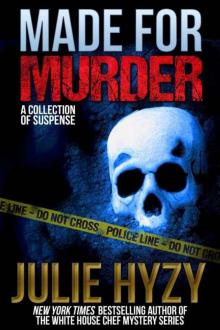 Made for Murder
Made for Murder Grace Among Thieves
Grace Among Thieves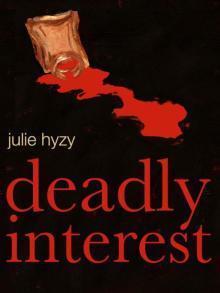 Deadly Interest
Deadly Interest Deadly Blessings
Deadly Blessings All the President’s Menus
All the President’s Menus State of the Onion
State of the Onion Grace Sees Red
Grace Sees Red Whitehouse Chef 04 - Grace Under Pressure
Whitehouse Chef 04 - Grace Under Pressure Hail to the Chef
Hail to the Chef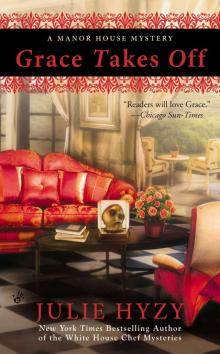 Grace Takes Off
Grace Takes Off Grace Against the Clock (A Manor House Mystery)
Grace Against the Clock (A Manor House Mystery) Grace Cries Uncle
Grace Cries Uncle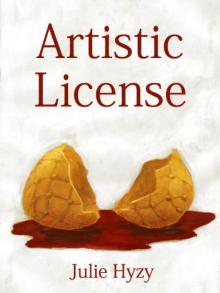 Artistic License
Artistic License Eggsecutive Orders
Eggsecutive Orders Grace Interrupted
Grace Interrupted Affairs of Steak
Affairs of Steak Fonduing Fathers
Fonduing Fathers Foreign Éclairs
Foreign Éclairs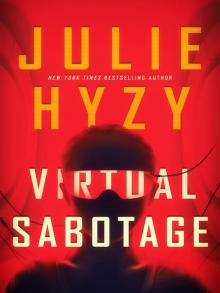 Virtual Sabotage
Virtual Sabotage Grace to the Finish
Grace to the Finish